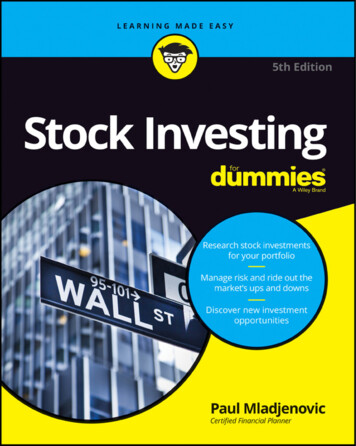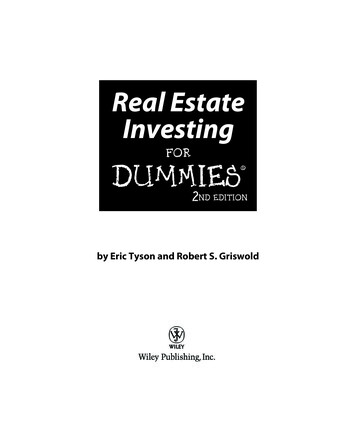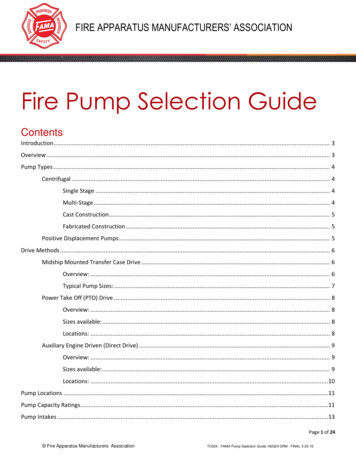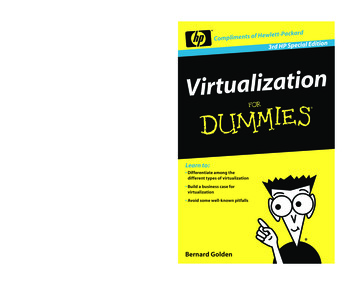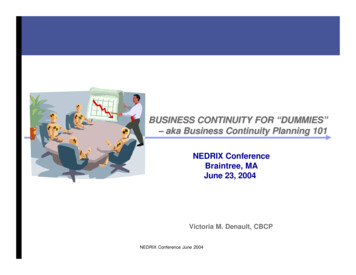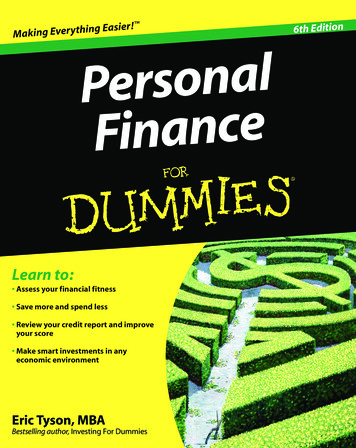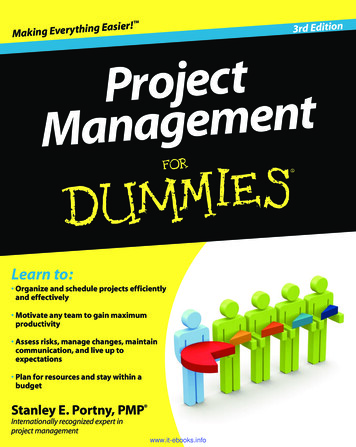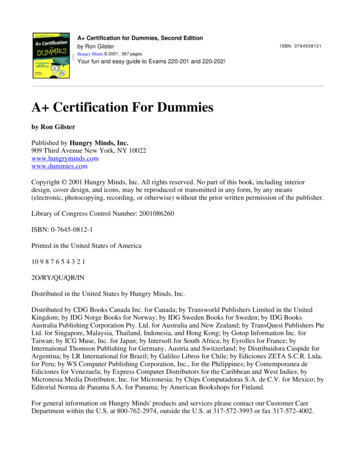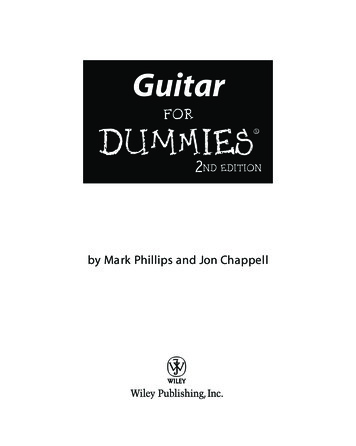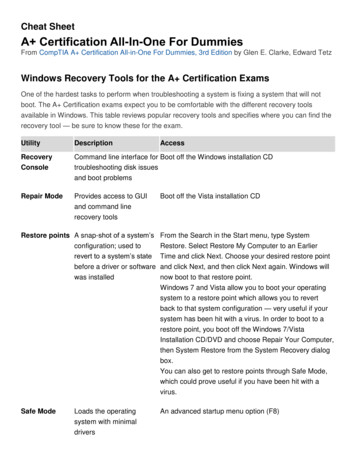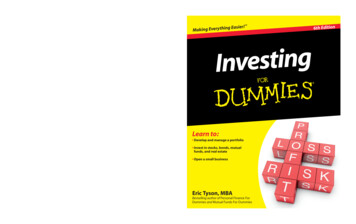
Transcription
Business & Economics/Personal Finance/Investingg Easier!Making Everythin 6th EditionInvesting For Dummies arms novice investors with Eric Tyson’stime-tested advice, recommendations, and the latest insightsand strategies to wisely invest in today’s market. You’ll getcoverage of all aspects of investing, including how to developand manage a portfolio; invest in stocks, bonds, mutual funds,and real estate; open a small business; and understand thecritical tax implications of your investing decisions. Investing 101 — get a crash course on what investments are, howeach type is different from the others, and what you can reasonablyexpect to earn from them Get street smart (Wall Street, that is) — understand what thefinancial markets are, how you can participate in them withoutlosing your head, and ways you can use them to start growingyour fortuneOpen the book and find: Time-tested investment strategies Help on choosing investmentsthat match your goals The 411 on investing in gold andcommodities What economic indicators are(and how they work) How tax law changes affect yourinvestment strategy Practical tips for investing in adown market Ways to overcome commonpsychological investmentobstaclesInvestingGet sound guidanceand proven investingadvice from Eric Tyson Be your own boss — discover the benefits of starting a smallbusiness or stay behind the scenes and try your hand at investingin someone else’s small venture Know your sources — find out why many investment “gurus” aren’treally experts and get a trusted list of resources and authoritiesworth listening tognitsevInLearn to: Develop and manage a portfolioGo to Dummies.com for videos, step-by-step examples,how-to articles, or to shop! Invest in stocks, bonds, mutualfunds, and real estate Open a small business 21.99 US / 25.99 CN / 16.99 UKEric Tyson, MBA, is an internationally acclaimed and bestselling personalfinance author, lecturer, and adviser. He is dedicated to teaching people tomanage their money better and to successfully direct their own investments.ISBN 978-0-470-90545-6Eric Tyson, MBATysonBestselling author of Personal Finance ForDummies and Mutual Funds For Dummies6th Edition
Get More and Do More at Dummies.com Start with FREE Cheat SheetsCheat Sheets include Checklists Charts Common Instructions And Other Good Stuff!To access the Cheat Sheet created specifically for this book, go t Smart at Dummies.comDummies.com makes your life easier with 1,000sof answers on everything from removing wallpaperto using the latest version of Windows.Check out our Videos Illustrated Articles Step-by-Step InstructionsPlus, each month you can win valuable prizes by enteringour Dummies.com sweepstakes. *Want a weekly dose of Dummies? Sign up for Newsletters on Digital Photography Microsoft Windows & Office Personal Finance & Investing Health & Wellness Computing, iPods & Cell Phones eBay Internet Food, Home & GardenFind out “HOW” at Dummies.com*Sweepstakes not currently available in all countries; visit Dummies.com for official rules.There’s a Dummies App for This and ThatWith more than 200 million books in print and over 1,600 uniquetitles, Dummies is a global leader in how-to information. Nowyou can get the same great Dummies information in an App. Withtopics such as Wine, Spanish, Digital Photography, Certification,and more, you’ll have instant access to the topics you need toknow in a format you can trust.To get information on all our Dummies apps, visit the following:www.Dummies.com/go/mobile from your computer.www.Dummies.com/go/iphone/apps from your phone.
20 Rules for Successful Investing Saving is a prerequisite to investing. Unless you have wealthy,benevolent relatives, living within your means and saving money areprerequisites to investing and building wealth. Know the three best wealth-building investments. People of all economic means make their money grow in ownership assets — stocks,real estate, and small business — where you share in the successand profitability of the asset. Be realistic about expected returns. Over the long term, 9 to 10percent per year is about right for ownership investments (such asstocks and real estate). If you run a small business, you can earnhigher returns and even become a multimillionaire, but years ofhard work and insight are required. Think long term. Because ownership investments are riskier (morevolatile), you must keep a long-term perspective when investing inthem. Don’t invest money in such investments unless you plan to holdthem for a minimum of five years, and preferably a decade or longer. Match the time frame to the investment. Selecting good investmentsfor yourself involves matching the time frame you have to the riskinessof the investment. For example, for money that you expect to use withinthe next year, focus on safe investments, such as money market funds.Invest your longer-term money mostly in wealth-building investments. Diversify. Diversification is a powerful investment concept thathelps you to reduce the risk of holding more aggressive investments.Diversifying simply means that you should hold a variety of investments that don’t move in tandem in different market environments.For example, if you invest in stocks, invest worldwide, not just in theU.S. market. You can further diversify by investing in real estate. Look at the big picture first. Understand your overall financialsituation and how wise investments fit within it. Before you invest,examine your debt obligations, tax situation, ability to fund retirement accounts, and insurance coverage. Ignore the minutiae. Don’t feel mystified by or feel the need tofollow the short-term gyrations of the financial markets. Ultimately,the prices of stocks, bonds, and other financial instruments are determined by supply and demand, which are influenced by thousands ofexternal issues and millions of investors’ expectations and fears. Allocate your assets. How you divvy up or allocate your money amongmajor investments greatly determines your returns. The younger youare and the more money you earmark for the long term, the greater thepercentage you should devote to ownership investments. Do your homework before you invest. You work hard for yourmoney, and buying and selling investments costs you money.Investing isn’t a field where acting first and asking questions later
works well. Never buy an investment based on an advertisement ora salesperson’s solicitation of you. Keep an eye on taxes. Take advantage of tax-deductible retirementaccounts and understand the impact of your tax bracket wheninvesting outside tax-sheltered retirement accounts. Consider the value of your time and your investing skills anddesires. Investing in stocks and other securities via the best mutualfunds and exchange-traded funds is both time-efficient and profitable. Real estate investing and running a small business are themost time-intensive investments. Where possible, minimize fees. The more you pay in commissionsand management fees on your investments, the greater the drag onyour returns. And don’t fall prey to the thinking that “you get whatyou pay for.” Don’t expect to beat the market. If you have the right skills andinterest, your ability to do better than the investing averages isgreater with real estate and small business than with stock marketinvesting. The large number of full-time, experienced stock marketprofessionals makes it next to impossible for you to choose individual stocks that will consistently beat a relevant market average overan extended time period. Don’t bail when things look bleak. The hardest time, psychologically, to hold on to your investments is when they’re down. Even thebest investments go through depressed periods, which is the worstpossible time to sell. Don’t sell when there’s a sale going on; if anything, consider buying more. Ignore soothsayers and prognosticators. Predicting the future isnearly impossible. Select and hold good investments for the longterm. Don’t try to time when to be in or out of a particular investment. Minimize your trading. The more you trade, the more likely you areto make mistakes. You also get hit with increased transaction costsand higher taxes (for non-retirement account investments). Hire advisors carefully. Before you hire investing help, first educateyourself so you can better evaluate the competence of those you mayhire. Beware of conflicts of interest when you consider advisors to hire. You are what you read and listen to. Don’t pollute your mind withbad investing strategies and philosophies. The quality of what youread and listen to is far more important than the quantity. Find outhow to evaluate the quality of what you read and hear. Your personal life and health are the highest-return, lowest-riskinvestments. They’re far more important than the size of your financial portfolio.Copyright 2011 Eric Tyson
Praise for Eric Tyson’s BestsellingFor Dummies Titles“Eric Tyson For President!!! Thanks for such a wonderful guide. With a clear,no-nonsense approach to . . . investing for the long haul, Tyson’s book says it allwithout being the least bit long-winded. Pick up a copy today. It’ll be your wisestinvestment ever!!!”— Jim Beggs, VA“Eric Tyson is doing something important — namely, helping people at all incomelevels to take control of their financial futures. This book is a natural outgrowthof Tyson’s vision that he has nurtured for years. Like Henry Ford, he wants tomake something that was previously accessible only to the wealthy accessible tomiddle-income Americans.”— James C. Collins, coauthor of the national bestsellersBuilt to Last and Good to Great“The organization of this book is superb! I could go right to the topics of immediateinterest and find clearly written and informative material.”— Lorraine Verboort, Beaverton, OR“Among my favorite financial guides are . . . Eric Tyson’s Personal FinanceFor Dummies.”— Jonathan Clements, The Wall Street Journal“In Investing For Dummies, Tyson handily dispatches both the basics . . . and themore complicated.”— Lisa M. Sodders, The Capital-Journal“Smart advice for dummies . . . skip the tomes . . . and buy Personal FinanceFor Dummies, which rewards your candor with advice and comfort.”— Temma Ehrenfeld, Newsweek“You don’t have to be a novice to like Mutual Funds For Dummies. Despite thebook’s chatty, informal style, author Eric Tyson clearly has a mastery of hissubject. He knows mutual funds, and he knows how to explain them in simpleEnglish.”— Steven T. Goldberg, Kiplinger’s Personal Finance Magazine“Eric Tyson . . . seems the perfect writer for a For Dummies book. He doesn’ttell you what to do or consider doing without explaining the why’s and how’s —and the booby traps to avoid — in plain English. . . . It will lead you through thethickets of your own finances as painlessly as I can imagine.”— Clarence Peterson, Chicago Tribune“Personal Finance For Dummies is the perfect book for people who feel guilty aboutinadequately managing their money but are intimidated by all of the publicationsout there. It’s a painless way to learn how to take control.”— Karen Tofte, producer, National Public Radio’s Sound Money
More Bestselling For Dummies Titlesby Eric TysonPersonal Finance For Dummies Discover the best ways to establish and achieve your financial goals, reduceyour spending and taxes, and make wise personal finance decisions. WallStreet Journal bestseller with more than 1.5 million copies sold in all editionsand winner of the Benjamin Franklin best business book award. Also checkout Personal Finance in Your 20s For Dummies and Personal Finance ForSeniors For Dummies.Mutual Funds For Dummies This best-selling guide is now updated to include current fund and portfoliorecommendations. Using the practical tips and techniques, you’ll designa mutual fund investment plan suited for your income, lifestyle, and riskpreferences.Home Buying For Dummies America’s #1 real estate book includes coverage of online resources inaddition to sound financial advice from Eric Tyson and frontline real estateinsights from industry veteran Ray Brown. Also available from America’s bestselling real estate team of Tyson and Brown — House Selling For Dummies andMortgages For Dummies.Real Estate Investing For Dummies Real estate is a proven wealth-building investment, but many people don’tknow how to go about making and managing rental property investments.Real estate and property management expert Robert Griswold and Eric Tysoncover the gamut of property investment options, strategies, and techniques.Small Business For Dummies Take control of your future and make the leap from employee to entrepreneurwith this enterprising guide. From drafting a business plan to managing costs,you’ll profit from expert advice and real-world examples that cover everyaspect of building your own business.
InvestingFORDUMmIES‰6TH EDITIONby Eric Tyson, MBAFinancial counselor, syndicated columnist, and author ofsix national bestsellers, including Personal Finance For Dummies ,Real Estate Investing For Dummies , andMutual Funds For Dummies
Investing For Dummies , 6th EditionPublished byJohn Wiley & Sons, Inc.111 River St.Hoboken, NJ 07030-5774www.wiley.comCopyright 2011 by Eric TysonPublished by John Wiley & Sons, Inc., Hoboken, NJPublished simultaneously in CanadaNo part of this publication may be reproduced, stored in a retrieval system or transmitted in any form orby any means, electronic, mechanical, photocopying, recording, scanning or otherwise, except as permitted under Sections 107 or 108 of the 1976 United States Copyright Act, without the prior written permission of the Publisher. Requests to the Publisher for permission should be addressed to the PermissionsDepartment, John Wiley & Sons, Inc., 111 River Street, Hoboken, NJ 07030, (201) 748-6011, fax (201) 7486008, or online at http://www.wiley.com/go/permiss
greater with real estate and small business than with stock market investing. The large number of full-time, experienced stock market professionals makes it next to impossible for you to choose individ-ual stocks that will consistently beat a relevant market average over an extended time period. Don’t bail when things look bleak. The hardest time, psychologi-cally, to hold on to your .
